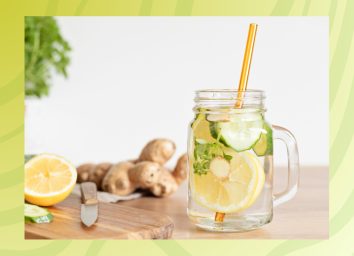4 Eating Habits Secretly Increasing Your Blood Sugar, Say Dietitians
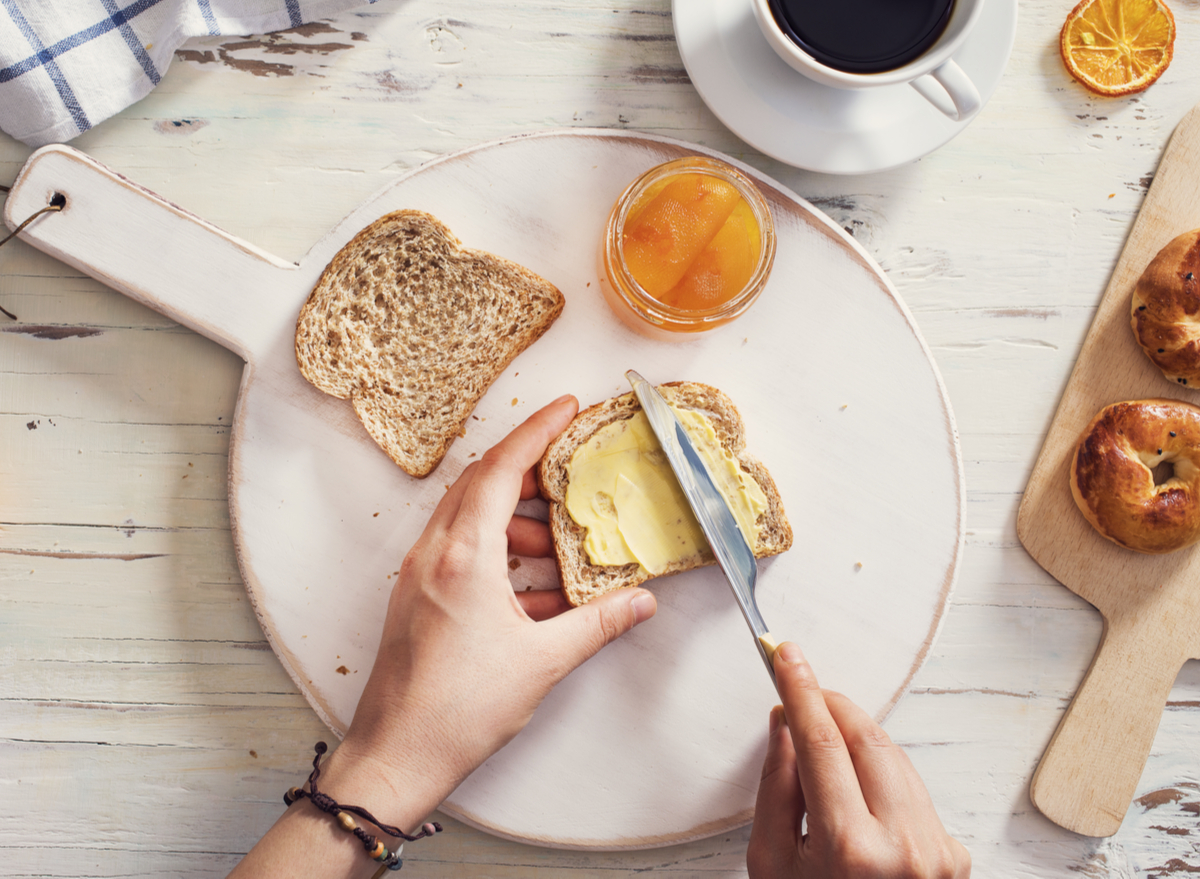
There are obvious food and drink items that can have a negative impact on blood sugar, like soda and candy, but these are not the only culprits when it comes to blood sugar-raising eating habits. In fact, you may be surprised to learn how some of your food choices are impacting your blood sugar.
Luckily, there are easy solutions to eating habits secretly increasing your blood sugar. Read on to learn more about how your food choices are impacting your blood glucose and how to easily improve your habits for better sugar control. And for more, don't miss these 7 Carbs Causing Chaos on Your Blood Sugar, Say Dietitians.
You're eating too little fiber.
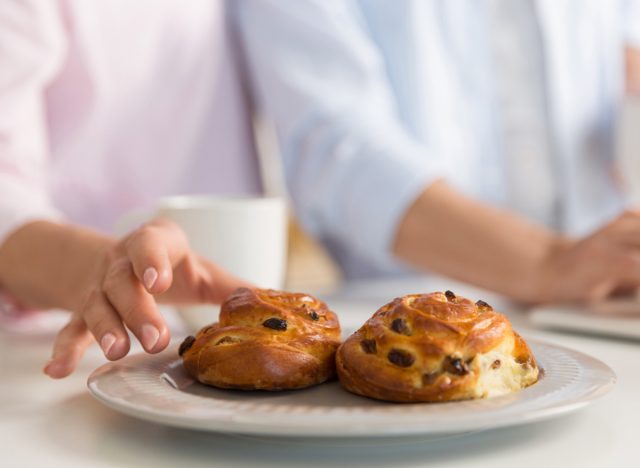
Carbohydrates come in many different forms. The refined sugar you add to coffee, the natural sugar in fruit, and fiber are all different forms of carbs. All of these forms impact your blood sugar in different ways, and it is important to understand how your carb choices could be raising your blood sugar.
Carb-dense foods that contain few to no grams of fiber are the choices most likely to cause a quick rise in blood sugar. Foods like candy, pastries, and sugary cereal all fall into this category. However, when fiber is introduced into a meal, even ones that contain added sugar, there is less likely to be as significant of an increase in blood glucose.
Fiber is a non-digestible form of carbohydrates and because of this, it can slow digestion and the speed at which glucose can enter your bloodstream. The end result is likely to be a more buffered impact on blood sugar, resulting in fewer sugar "spikes."
Daily fiber recommendations for men range from 30-38 grams, while women should consume 21-25 grams, according to Mayo Clinic. While fiber can lessen the impact refined sugar has on your blood glucose, it is still important to watch your total consumption of refined sugar while simultaneously eating more fiber-rich foods.
You're eating carbs on their own.
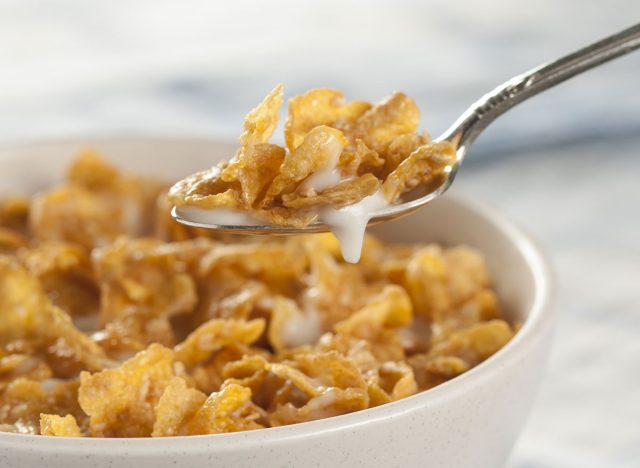
While fiber is able to slow digestion and how quickly carbohydrates enter the bloodstream, protein and fat have a similar impact. When these nutrients are all present at a meal, you have the best chances of avoiding a spike in blood sugar.
When you compare the blood sugar changes following a bowl of sugary low-fiber cereal versus a bowl of oatmeal, you are more likely to see a quicker release of sugar into the bloodstream following the cereal meal. The fiber present in oatmeal helps the carb slowly release into the bloodstream, and when that oatmeal is paired with protein-rich eggs and avocado that contains healthy fats, there will be an even more buffered blood sugar response. This is true for any type of carbohydrate that is paired with fat and protein.
So instead of having just a piece of toast for breakfast, try serving it alongside Greek yogurt topped with chopped nuts and fruit for a meal that contains healthy amounts of protein, fat, carb, and fiber.
You're eating hidden sugar.
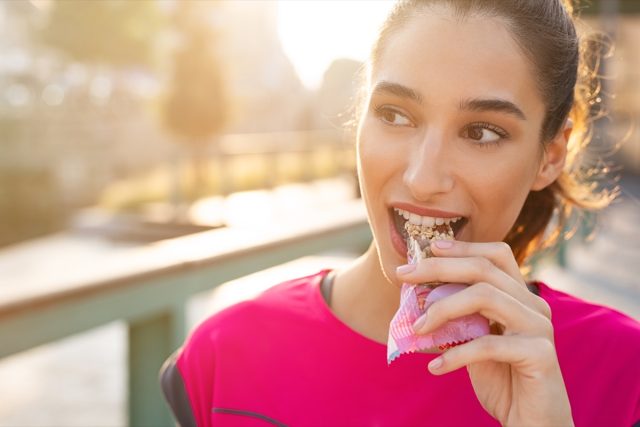
Most people aren't surprised to hear their afternoon energy drink packed with sugar is likely causing a quick surge in blood sugar. But, what about your favorite BBQ sauce, protein bar snack, and marinara sauce? All of these foods commonly contain added sugar, and they may be more impactful than you think.
As part of a well-rounded diet rich in fruits, veggies, lean protein, and healthy fat, each of these foods on their own aren't likely to have a huge impact on blood sugar. However, when multiple of these hidden sugar sources are consumed each day, especially in addition to more obvious forms of sugar, you are more likely to see increases in blood sugar.
When selecting processed food items, take a look at the ingredient list and nutrition facts panel. Compare brands and chose those with a lower amount of added sugar.
You're eating too much refined sugar.
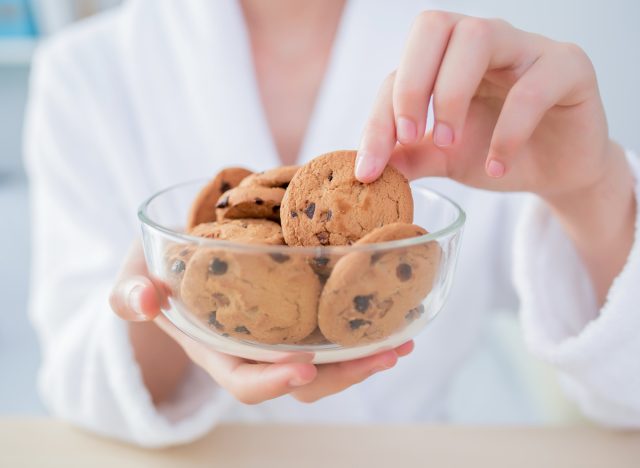
The type of sugar found in soda, juice, and sweet treats is known as refined sugar. This is the form of carbohydrate that has the quickest impact on increasing your blood sugar and provides no nutritional value outside of calories. The American Heart Association (AHA) recommends men should consume fewer than 36 grams of added sugar per day, while women should have fewer than 25 grams. Unfortunately, the AHA estimates adults in America consume an average of 77 grams per day, well over the recommended intake.
When it comes to refined sugar, portion control is the name of the game, and a small dessert after dinner and a teaspoon of sugar in your coffee can totally be part of a healthy diet. To lessen the impact refined sugar can have on your blood glucose, choose a reasonable portion of sugar-sweetened items and consume it with other foods that contain fiber, protein, and fat to lessen its blood sugar-raising effects. Also, try these The Best Fruits to Help Lower Blood Sugar, Says Nutritionist.




